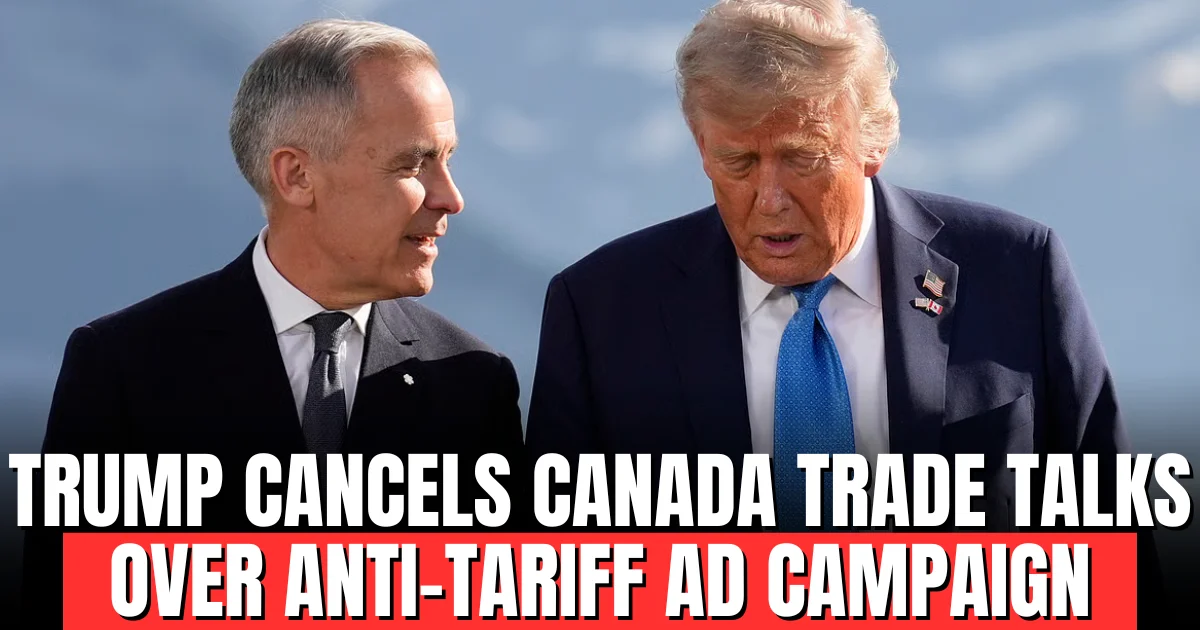Trump cancels Canada trade talks over anti-tariff ad campaign. $785B trade relationship at risk. What the ad said, reactions & economic stakes explained.
Table of Contents
- What Just Happened
- The Advertisement That Sparked Crisis
- US-Canada Trade at Stake
- Political Reactions
- Economic Consequences
- What Happens Next
- FAQ
Trump Walks Away from Negotiations
Former President Donald Trump announced Tuesday evening that he has “terminated” planned trade negotiations with Canadian officials, calling a new Canadian government advertising campaign against potential U.S. tariffs “disrespectful” and proof that Canada is “not serious about fair trade.”
Trump’s Announcement
💬 Trump (Truth Social, 5:47 PM ET):
“Just TERMINATED upcoming trade talks with Canada. Their government is running TV ads attacking ME and American workers. Very disrespectful! You can’t negotiate with people who are running propaganda campaigns against you. When Canada is ready to be SERIOUS about FAIR TRADE and stops the ads, maybe we’ll talk. Their loss!”
The Planned Talks
📅 What Was Scheduled:
- Date: October 22-23, 2025
- Location: Washington, D.C.
- Participants: Trump trade advisors, Canadian trade officials
- Purpose: Discuss Trump’s proposed 25% tariffs on Canadian imports
- Topics: USMCA modifications, dairy access, lumber disputes, energy trade
- Status: Cancelled unilaterally by Trump
Context:
Trump has promised if elected in 2026 to impose sweeping tariffs on imports, including from Canada. Canadian government sought preemptive negotiations to avoid trade war.
The Ad Campaign That Triggered Trump
“Tariffs Hurt Everyone” Campaign
Canadian Government Advertisement:
📺 30-Second TV Spot (Launched October 10):
Visuals:
- American factory workers
- Canadian lumber workers
- Empty store shelves with “price increased” signs
- Families at grocery stores seeing high prices
- Split screen: Trump announcing tariffs / factories closing
Voiceover Script (Approximate):
“Tariffs aren’t paid by other countries—they’re paid by you. When politicians threaten 25% tariffs on Canadian goods, American families pay 25% more for lumber, energy, and everyday products. Tariffs killed 200,000 American jobs in 2018. Let’s not repeat history. Fair trade works. Tariff tantrums don’t.”
Final Frame:
- “Protect American Jobs: Stop the Tariffs”
- Paid for by Government of Canada
Where Ads Are Running
📊 Media Placement:
Television:
- Fox News (during prime time shows)
- CNN, MSNBC
- Local stations in Michigan, Wisconsin, Pennsylvania, Ohio
- $12 million ad buy for 3 weeks
Digital:
- Facebook, YouTube targeting swing states
- Pre-roll ads on streaming services
- Banner ads on news websites
Geographic Focus:
States Trump needs to win in 2026, states economically tied to Canadian trade.
Canada’s Defense of Ad Campaign
💬 Canadian Trade Minister Mary Ng:
“This is a public information campaign informing Americans about the economic impact of tariff policies. We have a right and responsibility to share facts about trade policy that affects millions of jobs on both sides of the border. This isn’t personal—it’s about protecting workers.”
💬 Prime Minister’s Office Statement:
“Canada will always advocate for free and fair trade. We’re defending Canadian interests and the economic partnership that benefits both nations. If sharing factual economic information is controversial, we question the commitment to evidence-based policy.”
What’s Actually at Stake in US-Canada Trade
The Economic Relationship
📊 US-Canada Trade (2024 Data):
| Category | Amount | Details |
|---|---|---|
| Total bilateral trade | $785 billion | Largest trade relationship globally |
| US exports to Canada | $356 billion | Canada is #1 US export destination |
| Canadian exports to US | $429 billion | US is 75% of Canadian exports |
| US jobs tied to Canada trade | 2.7 million | Direct and indirect employment |
| Canadian jobs tied to US trade | 3.1 million | 18% of Canadian workforce |
Top Trade Categories
US Imports from Canada:
- Crude oil: $125 billion (largest single import)
- Vehicles/auto parts: $67 billion
- Machinery: $34 billion
- Wood/lumber: $28 billion
- Natural gas: $22 billion
- Aluminum: $18 billion
What 25% Tariffs Would Mean:
💰 Price Impacts:
- Gasoline: +0.50−0.50−0.75/gallon (crude oil tariffs)
- New homes: +8,000−8,000−12,000 (lumber tariffs)
- Vehicles: +3,000−3,000−5,000 (auto parts tariffs)
- Electricity: +15-25% in border states (natural gas tariffs)
USMCA Complications
The Treaty Problem:
⚖️ USMCA (Formerly NAFTA):
- Replaced NAFTA in 2020 (Trump’s signature achievement)
- Guarantees tariff-free trade between US, Canada, Mexico
- Legally binding international agreement
- Congressional approval required to exit
Trump’s Position:
- Claims USMCA “doesn’t work” (despite negotiating it)
- Wants to “renegotiate better terms”
- Suggests tariffs allowed under national security exemptions
- Legal scholars: dubious interpretation
Canada’s Position:
- USMCA is working as intended
- Tariffs would violate treaty
- Would challenge at WTO, USMCA dispute panels
- Prepared for retaliatory tariffs if US acts
Political Firestorm Erupts
Trump Allies’ Support
💬 Sen. Josh Hawley (R-MO):
“Canada running attack ads against American trade policy is outrageous interference. Trump is right to walk away. You don’t negotiate with governments that are campaigning against you.”
💬 Trump Advisor Peter Navarro:
“This ad proves Canada fears Trump’s tough trade stance. They’re trying to manipulate American voters. Shows we have leverage—they’re scared of fair terms.”
Critics Blast Decision
💬 Sen. Mitt Romney (R-UT):
“Walking away from trade talks over an advertisement is petulant, not presidential. Canada is our largest trading partner and critical ally. Adults resolve disputes through dialogue, not tantrums.”
💬 Sen. Sherrod Brown (D-OH):
“Canada is telling the truth—tariffs hurt American workers. Trump’s tariff obsession killed jobs in 2018-2019. Ending talks over accurate information shows he can’t defend his bad policy.”
Canadian Political Response
💬 Conservative Opposition Leader (Canada):
“The Liberal government’s ad campaign was unnecessarily provocative. We need to work with the United States, not antagonize them. This is diplomatic malpractice.”
💬 Canadian Labor Unions:
“We support the government’s ad campaign. American and Canadian workers both suffer from tariff wars. Educating the public about economic reality isn’t interference—it’s responsibility.”
Business Community Alarm
💬 US Chamber of Commerce:
“Cancelling trade negotiations over an advertisement is concerning. $785 billion in trade and 2.7 million American jobs are at stake. We urge both sides to resume dialogue immediately.”
💬 Canadian Chamber of Commerce:
“The ad campaign was ill-advised, but ending talks is worse. Business needs certainty. Both governments must prioritize economic stability over political posturing.”
Economic Consequences of Talks Collapse
Immediate Market Reaction
📉 Markets
- Canadian Dollar: Down 1.8% vs USD (lowest since March)
- US-Canada trade stocks: Down 2-4%
- Lumber futures: Up 6% (supply disruption fears)
- Canadian banks: Down 3-5%
- Auto manufacturers: Mixed (GM -2%, Ford -1.5%)
Industry-Specific Impacts
Energy Sector:
⚡ Critical Dependency:
- Canada supplies 60% of U.S. crude oil imports
- 4.3 million barrels per day cross border
- No alternative supplier can replace volume
- Tariffs = higher gas prices for Americans
Automotive:
🚗 Integrated Supply Chains:
- Auto parts cross border 6-8 times during manufacturing
- 25% tariff applied each crossing = 150%+ cumulative
- Would devastate Detroit, Ontario auto sector
- 350,000 jobs at immediate risk
Lumber/Construction:
🏠 Housing Market Impact:
- Canada supplies 30% of U.S. lumber
- Already tight housing market
- Tariffs add 8,000−8,000−12,000 to new home prices
- Construction jobs affected
Broader Economic Risks
⚠️ Recession Scenario:
Economists warn Trump tariff plan + Canada retaliation could:
- Reduce US GDP by 0.5-1.2%
- Eliminate 300,000-500,000 jobs
- Increase consumer prices 2-4%
- Trigger retaliatory tariffs from Canada, EU, others
- Undermine dollar’s reserve currency status
What Comes Next
Short-Term (Next 7 Days)
📅 Likely Developments:
Diplomatic Efforts:
- Back-channel communications (already occurring)
- Business groups pressure both sides
- Congressional calls for talks resumption
- Potential face-saving pathway negotiated
Canadian Response:
- May pull ads (face-saving for Trump)
- Or: Double down, expand ad buy (defiance)
- Consider retaliatory measures
- Outreach to U.S. governors, Congress
Medium-Term (To Election 2026)
Scenario 1: Talks Resume (60% Probability)
- Canada quietly ends ad campaign
- Trump claims victory (“they backed down”)
- Talks rescheduled under different framing
- No substantive policy change
Scenario 2: Standoff Continues (30% Probability)
- No talks until after 2026 election
- Issue becomes campaign topic
- Business uncertainty persists
- Markets remain volatile
Scenario 3: Escalation (10% Probability)
- Trump announces tariffs even as candidate (symbolic)
- Canada retaliates with own measures
- Trade war rhetoric intensifies
- Economic damage begins before Trump even in office
If Trump Wins 2026
Then What?
If elected, Trump would face:
- USMCA treaty constraints (requires Congress to exit)
- Economic realities (tariffs hurt US consumers)
- Business/Republican pressure (chamber, manufacturers oppose)
- Canada’s WTO challenges
- Retaliation from Canada, potentially others
Historical Pattern:
Trump’s 2018 tariffs on Canada eventually resolved through negotiations. Likely similar outcome if elected—tough rhetoric, eventual deal.
Frequently Asked Questions
Can Canada legally run ads in the US?
Yes. First Amendment protects speech, including by foreign governments. Canada can buy ads just like any organization. Not illegal or unprecedented.
Is this foreign interference?
Not by legal definition. Foreign interference involves election manipulation, disinformation, illegal contributions. Educational ads about policy impacts are legal advocacy.
Could Trump impose tariffs as a candidate?
No. Only sitting presidents can impose tariffs. Trump’s current threats are campaign promises, not actionable policy.
Would tariffs violate USMCA?
Likely yes, unless justified under national security exemptions (dubious claim for Canadian trade). Canada would challenge through treaty dispute mechanisms.
Will talks actually stay cancelled?
Probably not permanently. Diplomatic talks are often “cancelled” then quietly resumed. Both sides have incentive to negotiate eventually.
What would Canada’s retaliation look like?
Previous pattern: Target politically-sensitive US exports (bourbon, Harley-Davidson, Florida orange juice) in Republican districts/swing states.
Is this typical Trump negotiating?
Yes. Walking away, creating crisis, then returning for “better deal” is signature Trump tactic. Whether effective in diplomacy is debated.
Conclusion
Donald Trump’s decision to “terminate” trade talks with Canada over a government advertising campaign represents the latest flashpoint in the contentious relationship between the former president and America’s largest trading partner.
What’s Clear:
✅ Canada ran ads criticizing potential tariffs
✅ Trump walked away from scheduled negotiations
✅ $785 billion trade relationship now uncertain
✅ Both sides claim moral high ground
✅ Business community alarmed
What’s Uncertain:
❓ Whether talks will resume
❓ If ads will continue
❓ Trump’s actual tariff plans if elected
❓ Economic impact of prolonged uncertainty
❓ How voters will react
The Reality:
Canada and the United States are economically intertwined in ways that make dramatic trade disruptions mutually destructive. 2.7 million American jobs depend on Canadian trade. Supply chains are deeply integrated. Neither country benefits from trade war.
But political theater often trumps economic sense. Trump’s base loves tough trade talk. Canadian government faces domestic pressure to stand firm. Both may sacrifice economic interest for political positioning.
The advertisement that triggered this crisis simply stated economic facts: tariffs raise prices, hurt workers, and damage both economies. That Trump responded by ending talks rather than disputing the facts may itself be revealing.
For now, the world’s largest bilateral trading relationship hangs in balance over a 30-second TV commercial. Whether cooler heads prevail, or campaign politics drive policy, remains to be seen.
One thing is certain: millions of workers on both sides of the border hope their leaders remember that trade isn’t a zero-sum game—and that winning requires both sides coming to the table.
Developing story. Updates as negotiations evolve.

